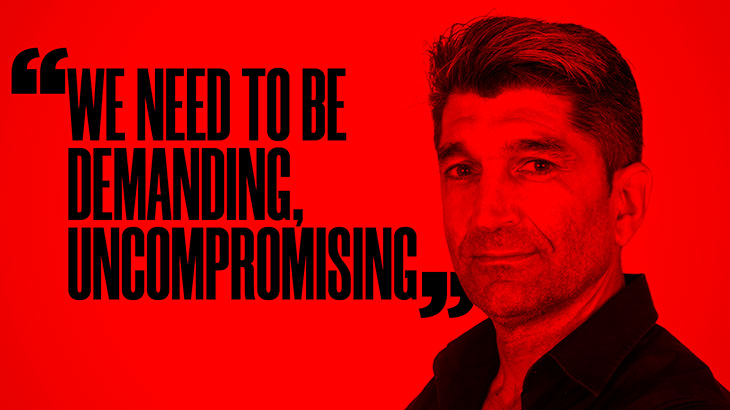
Interview
Manu Pirès: “We need to be demanding, uncompromising"
After seven years spent building the foundations of the Nice Academy, Manu Pirès and OGC Nice went their separate ways in 2014. His hard work continued to bear fruits, with an explosion of young talent, with some contributing to write the recent history of the club. Five years later, destiny has brought man and institution together once more. Named as Head of the Academy back in September, the adopted Niçois equally took over responsibility for the reserve team in the National 3. Although Manu’s objectives remain the same: “bring through as many players as possible for the highest level of football”, his methods have been refined during these five rich and educational years. For OGCNice.com, the demanding coach (48 years old) looks back over his career, outlines his project, his aspirations and their application in practice. Never losing that “attention to detail”.
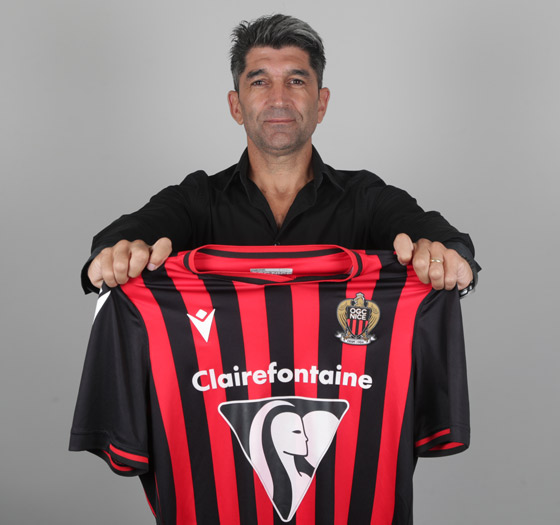
Returning home
Manu, here you are back at OGC Nice. What are your first impressions?
It’s like coming home! I feel like I have come back to the place where I grew up, evolved. It’s also fantastic to be back with the people that we worked with on a daily basis, and with whom we experienced incredible times, both on a sporting and a personal level. I feel like I never left them. OGC Nice, it’s a love story. When you fall in love with this club and this city, you can only be fulfilled by coming back here.
How did you feel when you left in 2014?
It was painful, you can’t hide from that. But it’s part of the job, and you need to be prepared to face up to it.
Have you followed the growth of the club, and more specifically the growth of the Academy?
Of course, I still have friends at the club. I am still in contact with a large number of the players that came through the Academy and their families. They aren’t all professionals, but we hope that we trained the lads to have enough rigour and expectations of themselves to allow them to live full and rich lives. As for the club, I have always kept the app, the goal alerts, my short messages when things go well or less well. When your heart is in Nice, it’s impossible to detach yourself from OGC Nice. It’s not possible.
“It’s impossible for your story in Nice to end like that”
There was a feeling of unfinished business?
Definitely! With my colleagues at the time, we worked incredibly hard and we were in the process of building something huge for the Academy. That all exploded mid-flight, for certain reasons. Since that day, I haven’t stopped saying to myself: “It’s impossible for your story in Nice to end like that”. Luckily, the opportunity presented itself to me once more. It’s an honour, a privilege to work for OGC Nice and I will be putting in my entire conviction and strength to achieve excellent things in the years to come.
Did the chance to work with Jean-Pierre Rivère and Julien Fournier once more play a part in your choice?
Of course. They are both people who mean a lot to me and who I respect enormously. Despite my departure, there was never any hint of animosity between us, quite the contrary. I know how much they have worked to build this club. It didn’t happen on its own. You need a lot of commitment, risks and sacrifices, especially with your family. They are excellent leaders who have built a really big club. I was sad to see them leave in January because it was going to take a very solid person to replace them and to get things moving. Thankfully, they came back in the best way possible, with an owner in line with their ambitions.
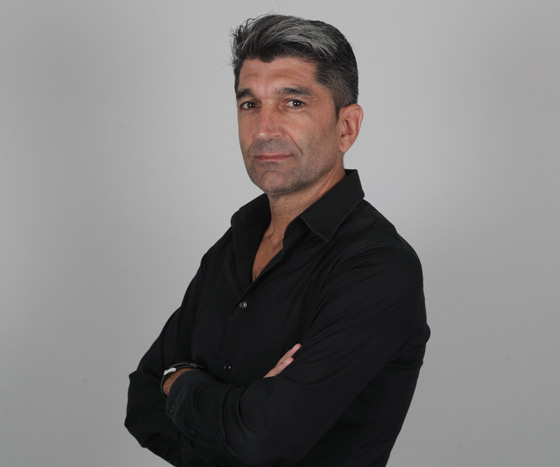
What does the arrival of INEOS change in terms of the Academy?
There is constant evolution at OGC Nice. The club’s project grows year on year. Everyone needs to get to the same level. There is no place for amateurism. By working more, better and stronger, we can create a name for ourselves in football at the highest level. Everyone needs to say to themselves: “I am here to do my job as well as possible”. To play at the Allianz in Ligue 1 and in Europe, it’s an immense pleasure. It’s worth putting in more effort than you are used to putting in, right?
The big ambitions of the club in terms of the Academy, need to be achieved through areas of excellence: in the development of players of the highest level of course, but also excellence in education and in the medical care of our players.
Five years and lessons learned
Can you tell us about the five years that you spent away from the club?
Upon the advice of René Marsiglia (see section at the bottom of this article), I joined Red Star, in the National League. We had an exceptional first season, breaking records and securing promotion to Ligue 2. The following season, Rui Almeida took charge and we continued in the same light and were playing for promotion to L1 for most of the season The third year was a bit more complicated with relegation to the National League again. Then I joined Stade Levallois as assistant to Jean-Marc Nobilo, an exceptional individual. It was a fantastic adventure on a human level, even though we didn’t manage to earn promotion to L2. I then joined Monaco, initially to coach Cercle Bruges (ASM’s link club, Editor’s note). I ended up looking after their academy. It’s the first time that I wasn’t coaching, and I really missed being out there on the training ground. I knew that I needed to get back to having that contact with the players and training sessions quickly.
“To generalise is extremely risky”
What did these various experiences bring you?
Today, I get straight to the point. I have learned a lot about tactical organisation and management. I understand that you constantly need to be connected to your players. That you need to love them, and at the same time to hate them for not doing the work that they should be doing. I learned to managed egos in the dressing room: everyone is different and to generalise is extremely risky. You need to consider that every player is unique, with an entirely different personality. Even if you are harsh with a player, you need to reconnect with him immediately after. In his head there is a hard drive that is constantly spinning… And you can’t let it spin for too long before bringing answers to his questions. These last five years have also comforted me in my convictions at the highest level of football.
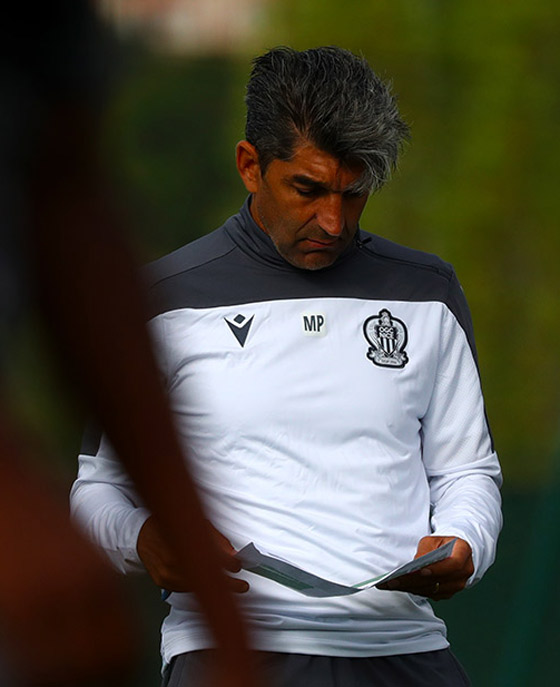
What are they?
You need to be extremely demanding, intransigeant with details, technical ability and effort. The spirit of competition needs to be integrated as soon as possible too. I was lucky to mix with players who had excellent careers, who had played in the best stadiums. Everyone of them is in agreement: without rigour and a culture of hard work, it’s impossible to get there, unless you are an extraterrestrial.
Of those players that you saw bloom, which player would you cite as an example for future generations?
I think of Jordan Amavi, who had incredible mental strength in the the Academy and was able to wait for his opportunity. He has had further difficult moments throughout his career and has always been able to overcome them. There is also Yoan Cardinale, who is an example of bravery, strength and power. His family pass on all of his values, of combativeness and resilience. Yoan, is the perfect example of the mental strength that you need to succeed in football.
“We are no longer at Charles-Ehrmann!”
What has changed since you left?
First and foremost, the infrastructure of the club. It’s completely different from what we knew. Today, we have a fantastic stadium, a world class training ground. We need to be at the top of our game. We are no longer at Charles-Ehrmann, we have a great tool at our disposal, people are confident in our ability, believe in us and expect results. We need to get to work quickly in order to perform. I can feel that we are headed to an environment that is much more demanding.
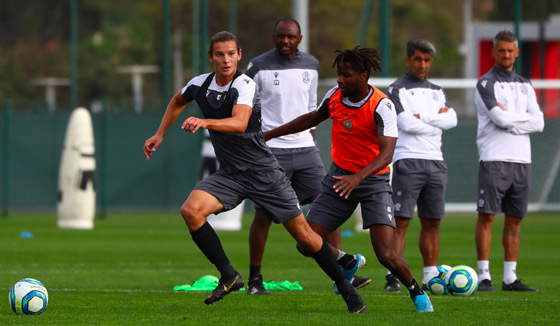
And then on the other hand, what hasn’t changed?
The look on peoples faces. We will never win unanimous support but I feel a lot of affection from lots of people at the club. Back when I was last here, there was a huge expectation to grow the club, amongst all of the employees. Today, that desire is still there.
“The Nice Way”
What objectives have you set yourselves for this new challenge?
When you are coming in from the outside, it’s important to inspire. I am gong to try hard to create this synergy, sharing the benefits of my experience with the others. My ambition is to make this Nice Academy the most high performing, the most complete and the most adapted to the needs of every youngster, so that we can develop the maximum number of players of the highest level. That means being demanding in our work, in the content of every session, in the attitudes of everyone on a daily basis and a respect of our values. The players need to take on this culture of hard work, get the taste of effort, but at the same time keeping the pleasure at all times, that’s important. They also need to discover and understand the demanding nature of football at the highest level, and above all the efforts that need to be put in both on and off the pitch. These aren’t necessarily a given, especially in France.
Why is it more difficult in France?
I talk with lots of former players and well-established coaches. What you find out is quite enlightening: a Frenchman in France works less well, and only starts to work when he leaves. France is the country of human rights, of profusion, of protection and maybe we don’t go far enough to shake up our youngsters. When you see the intensity of the matches at the highest level, in the Champions League, in the Europa League… We need to instil that in them as soon as possible. If some players succeed, it’s not by chance. Neal Maupay, Jordan Amavi, for example, were made to reach the highest level. These mental qualities need to be developed amongst our youngest players.
To have great players in the first team must also make things easier…
Of course! The best form of propaganda comes from inside the club. The top players show what you need to do on a daily basis, especially in terms of simplicity. Now, we have youngsters who try difficult things. Dante, Dolberg and others have played with some of the best players. They will be able to say to the youngsters: “Be careful, you aren’t taking the right path.”
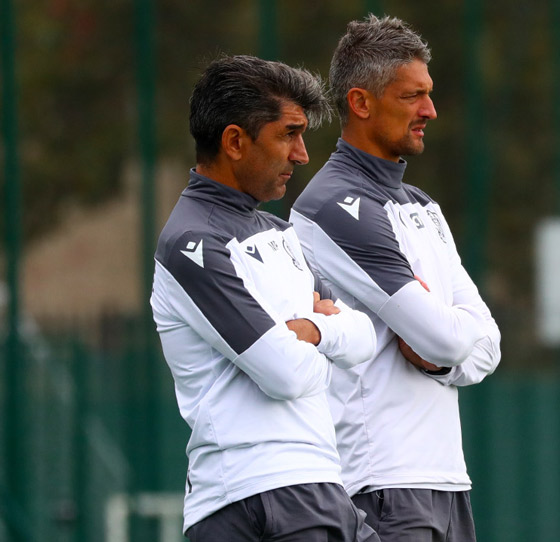
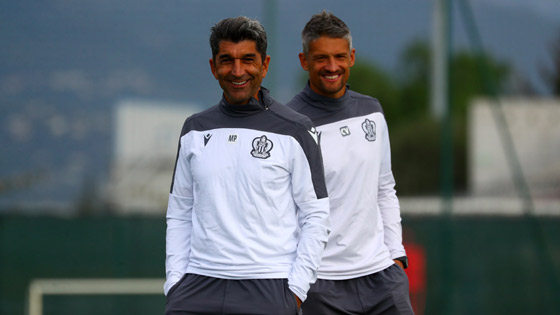
Speaking of “internal propaganda”, you took charge of the reserves with Cédric Varrault…
If you want to build the perfect backroom staff, there is nothing better than a former player who came through the ranks at the club and has played over 500 matches as a professional. He is more than an assistant, he is often taking sessions on his own. He is ready to listen and has a hunger to learn, something that is important, he gives people a desire to follow him. I knew the man, I am now discovering the colleague. He is an incredible professional, with a level of discipline and rigour. It’s great, a very nice discovery! There is also Emerse Faé (U19s coach), who needs no introductions and Fabrice Garrigues (U17s coach) who has huge experience in the academy, and an eye for future talent for the club. The staff is made up of competent fitness coaches, who are experienced in football. There are also players that I knew in the academy, who didn’t succeed and are 1000% devoted to the club, in various roles. Together, these people make up a perfect puzzle, which will allow us to achieve some excellent things together!
“Football is also a combat sport”
What are the new principles of the Nice Way in the Academy?
Pragmatic and efficient football. Nice need to scare people. Le Gym has always made people think of a people’s club with a strong personality, bravery, suffering and hard work. With possession football, we have maybe become used to forgetting - in Nice and elsewhere - that football is a combat sport. So you need the skill, but also a compétitive nature to win you duels and put in the effort both offensively and defensively. The Nice Way also needs attention to detail. We need to be demanding, uncompromising so that every control and pass is well executed. If we are not focussed on the details, passes, runs, the work we put in for our teammates, we will never get there.
Is this demanding nature found off of the pitch too?
Everything is linked. You need to be respectful of lots of values: cleanliness, politeness, punctuality… When you have just four steps to walk down to go to your classes and you arrive late, it’s unacceptable. In the same way as leaving water bottles on the pitch. It’s not being rigid: I just ask people to be normal.
Is this achievable with the new generation?
I am not naive, I know that generations have changed and that youngsters nowadays have other needs. But we as coaches, we can’t become lax. We need to keep our values and not give up on what we feel is important. With access to information in real time, the youngsters are maybe more brilliant and cultivated than before. But they are also a lot more fragile. The smallest irritation can bother them, knock them off course. We need to get them used to not just doing what they want to. At a red light, you have to stop. These are the rules of world. You also have to listen to them, help them. There are things that can be negotiated, others that can’t be. They are here to enjoy themselves, that’s our goal, but they are also here to follow the path that we set them.
Ending Lamine Diaby Fadiga’s contract sent a strong message…
Lots of things happen within clubs, which aren’t always covered in the press: thefts, fights, absences etc. Nowadays, you need to send a strong example with strong decisions. The message is clear: no player in the world, however talented he may be, can be above a club. It would weaken everything. It’s a strong decision because Lamine is a talented player and we don’t doubt that he will have future success if he uses this experience as a lesson. In the future, it will also be useful for lots of kids, who are already aware of the consequences of an act like that.
“On the same wave length as Patrick Vieira”
What is the nature of your dealings with Patrick Vieira?
We are on the same wave length. He wants rigour, style, a demanding culture and players who put in the effort. I am delighted to have the same aspirations and principles as the coach of the first team and the whole of the club. Patrick Vieira takes youngsters with him every day in training. Every youngster needs to know that the door is open, starting from this year. The day when he is sure that the player is at the required level, he will give him a chance. Patrick really wants us to benefit from his experience. We are going to put a common methodology in place. It’s incredible to have this unity, from the youngsters all the way through the Academy to the pros.
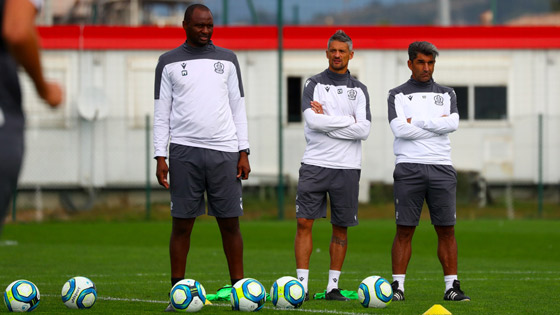
Is a promotion for the Reserve team into the National 2 an objective?
The objective consists of playing very young players. Playing players over 20 is no longer of interest. If we play with 15, 16, 17 and 18 year olds, it will be more interesting as a coach. In National 2, there is a certain level and it’s hard to play very young players. The N3 is fine for me. But then again, if we can get promotion, we won’t turn it down.
And the Gambardella?
Nobody can say that they are going to win the Gambardella. The year when we won it (in 2012), we knocked out Ajaccio on penalties in the first round! But it’s true, we also had a generation of youngsters who worked for several years together and who were completely bought into the philosophy at that time. Today, we have lots of individually minded players, you need to set out that pedagogical strategy to lead them all on the collective project. The Gambardella is a worthwhile and valuable target, but the objective will always be to develop youngsters.
‘René Marsiglia is always with me”
Following his interview, Manu Pirès wanted to pay tribute to the late René Marsiglia, who passed away in 2016. “Maurice Cohen and Roger Ricort named René as Academy Director, and he brought me here. I am eternally grateful for that. He was a longstanding friend, we played together and then worked together at Amiens. He is one of the few people with whom you could talk about football that much. He is the best coach I have known in my career. Even on the pitch, he was already an expert of the game. When we spoke about football, we didn’t stop. I owe hm so much and I think about him all the time. René is always with me, with us. He is a personality of the academy and the club, He also saved the club not that long ago with his team of staff. René Marsiglia, you mustn’t forget him and we will never forget him.”
Manu was talking to Fabien Hill


